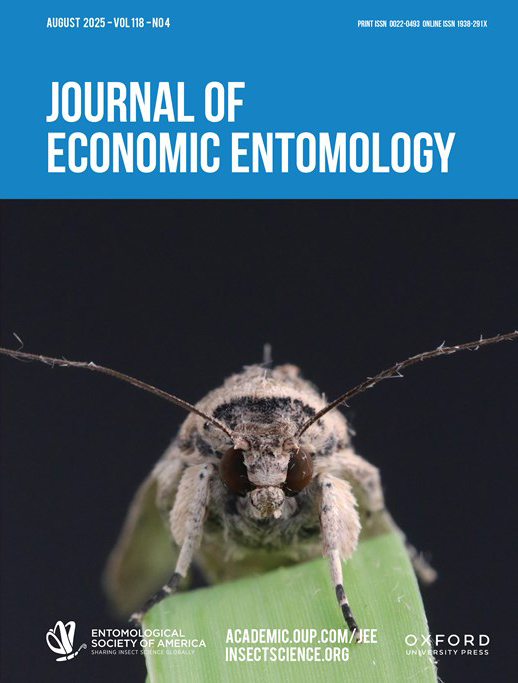Cornell entomologist, ESA Fellow joins premier journal in applied entomology
 Annapolis, MD; October 7, 2025—Jeffrey G. Scott, Ph.D., professor of entomology at Cornell University, has been selected as a new co-editor-in-chief of the Entomological Society of America's Journal of Economic Entomology.
Annapolis, MD; October 7, 2025—Jeffrey G. Scott, Ph.D., professor of entomology at Cornell University, has been selected as a new co-editor-in-chief of the Entomological Society of America's Journal of Economic Entomology.
The ESA Governing Board approved Scott's selection in September after an open search. Scott will replace Nan-Yao Su, Ph.D., distinguished professor of urban entomology at the University of Florida, who will step down as a co-editor-in-chief at the end of 2025 after more than six years in the role.
Scott (pictured at right) will join Mike Brewer, Ph.D., field crops entomologist and associate professor at Texas A&M University, and Lisa G. Neven, Ph.D., research entomologist at the U.S. Department of Agriculture's Agricultural Research Service, in the co-editor-in-chief role.
"Dr. Jeffrey Scott has an extensive research background in topics critical to economic entomology, and his publishing and leadership experience will be great assets to the Journal of Economic Entomology," says ESA President Lina Bernaola, Ph.D. "The ESA Governing Board is excited to welcome him into this role, and we would like to thank Dr. Nan-Yao Su for his service to the journal as well."
 The Journal of Economic Entomology is ESA's largest journal by publishing volume and one of the most-cited journals in entomology. Its impact factor has grown from 1.779 to 2.4 in the past six years.
The Journal of Economic Entomology is ESA's largest journal by publishing volume and one of the most-cited journals in entomology. Its impact factor has grown from 1.779 to 2.4 in the past six years.
Andrew Short, Ph.D., ESA vice president-elect and chair of the search committee, lauded Scott's record of contributions to insect science. "Dr. Scott has been both a prolific researcher and author as well as a mentor to a long list of students and colleagues in entomology over the course of his career," Short says. "His experience will serve well in continuing to grow the Journal of Economic Entomology's status as a leading publication in our field."
Scott's initial term as co-editor-in-chief will last four years and begins January 1, 2026.
"I am thrilled to be selected as a co-editor-in-chief for the Journal of Economic Entomology," Scott says. "I am looking forward to working with Lisa and Mike, the talented group of subject editors, and our great ESA staff."
Scott brings more than four decades of professional experience in science and entomology to his role with the journal, specializing in insect molecular biology, insecticide toxicology, and insecticide resistance. He has served on the faculty in the Department of Entomology at Cornell since 1986, including as department chair from 2007 to 2013 and director of graduate studies from 1995 to 1998 and 2005 to 2007. He has published more than 230 peer-reviewed articles in his career. Scott was named a Fellow of the Entomological Society of America in 2013 and an ESA Science Policy Fellow in 2017, and he served as president of the ESA Physiology, Biochemistry, and Toxicology Section in 2011. Scott earned an associate degree in biology from Grand Rapids Junior College in 1977, a bachelor's degree in biochemistry at Michigan State University in 1979, a master's degree in entomology at MSU in 1981, and a Ph.D. in entomology at the University of California, Riverside, in 1985.
###
CONTACT: Joe Rominiecki, jrominiecki@entsoc.org, 301-731-4535 x3009
ABOUT: ESA is the largest organization in the world serving the professional and scientific needs of entomologists and people in related disciplines. Founded in 1889, ESA today has nearly 7,000 members affiliated with educational institutions, health agencies, private industry, and government. Headquartered in Annapolis, Maryland, the Society stands ready as a non-partisan scientific and educational resource for all insect-related topics. For more information, visit www.entsoc.org.
The Journal of Economic Entomology publishes research on the economic significance of insects and is the most-cited journal in entomology. It includes sections on apiculture and social insects, insecticides, biological control, household and structural insects, crop protection, forest entomology, and more. For more information, visit https://academic.oup.com/jee, or visit www.insectscience.org to view the full portfolio of ESA journals and publications.
